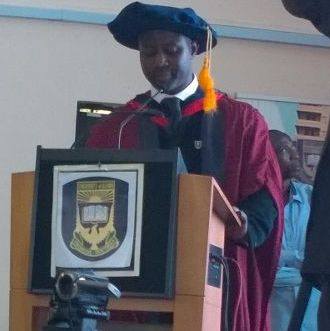Akanbi canvasses alternative dispute resolution

A Professor of Law at the University of Ilorin, Muhammed Mustapha Akanbi, has urged disputes by embracing the alternative dispute resolution (ADR) procedures of arbitration, which he said, would ensure that justice is delivered in a timely, effective and affordable manner.
Prof. Akanbi, who made this submission last Thursday (November 13, 2014) while deliversing the 152nd Inaugural Lecture of the University, noted that given the present poor stat of the legal system in the country, ADR offers and effective means of dispute settlement.
In the Lecture, entitled “Contending Without Being Contentious: Arbitration, Arbitrators And Arbitrability”, the don explained the principle behind arbitration, saying that it allows parties to freely choose how to settle their disputes and the acceptable forum for doing so,
The scholar canvassed “a justice system that is flexible and accessible and that delivers timely, effective and affordable outcomes”, adding that “arbitration is a key to achieving this”.
Prof. Akanbi said, “In commercial transaction, conflict will always be inevitable, However, since commercial pragmatism and not legal accuracy is the preference of men of commerce, parties must learn to contend without being contentious, what is needed however is not an idealistic embrace of a novel fad that will replace the courts, but the best utilisation of appropriate procedures that will facilitate the fair and efficient settlement of commercial disputes in Nigeria.”
The former Dean of the Faculty of Law, who called for urgent reforms of the civil justice system in Nigeria, also highlighted the benefits of a reformed judicial system on arbitration practice. He pointed out that more professionals should be encouraged in the practice, explaining that arbitrators require skill, knowledge and competence in the field of dispute resolution and the field of endeavour from which the dispute arose.
Prof. Akanbi, however, argued that the preponderance of members of the legal profession in the arbitration practice, such as lawyers and retired judges, who possess little or no training in the field of arbitration, have hindered the potential benefits of the arbitral process instead of enhancing it, because of “the gradual legalization of the arbitral process, which has, in turn, adversely affected the way arbitration proceedings are conducted in Nigeria.”
The don noted further, “The incursion of these categories of persons is fast turning the arbitration fora into alternative courtrooms, as the long period spent in the courtrooms by the retired judges and lawyers have made them to become so ingrained with strict legal principles to the resolution of disputes. They appear to have developed an innate faculty for approaching the exercise of arbitral functions, which requires flexibility in procedures and decision- making from the same adjudicative stance. Consequently, in practice, when they are appointed as arbitrators, 'they tend to direct proceedings very much as if they are in the courts of law, ignoring the inherent differences between arbitration and the conventional judicial process and thereby forfeiting most of the potential advantages of arbitration.”
Recounting his contributions to legal education, the scholar told the audience, which included his father, the renowned jurist and former Chairman of the Independent Corrupt Practices and other related offences Commission (ICPC), Hon. Justice Mustapha Akanbi, that the Faculty of Law of the University of Ilorin is the first Law Faculty in the country to teach ADR and Arbitration Law at the undergraduate level, a course which he taught. He suggested that “the subject of arbitration and other ADR forms should be incorporated in Law curriculum as a core subject to be taught at the undergraduate level”.
In his recommendations, Prof. Akanbi called for the enactment of a separate domestic arbitration law which will take into cognizance the peculiarities of the country's domestic market and the existing case laws of the courts on domestic arbitration in Nigeria. He stressed that in the making of the proposed domestic arbitration statute, extensive consultation should be made with relevant stakeholders since the Arbitration Act of 1988 did not have the advantage of going through the necessary legislative process.
The Inaugural Lecturer, who also observed that the provisions of Section 34 of the Arbitration and Conciliation Act of 1988 appears fraught with some constitutional challenges, called for an amendment in line with the supremacy of the 1999 Constitution, noting that “access to courts is an inviolable right guaranteed by the Constitution and any attempt by the legislature to stifle such a right will not only be anachronistic but while also amount to an erosion of confidence in the arbitral system.”
Cloud Tag: What's trending
Click on a word/phrase to read more about it.
Adebayo Mohammed Kamaldeen Salman Alada Falokun-Oja Amuda Aluko Olosi Of Osi Joseph Offorjama Democracy Day Seed Technologies Quareeb Islamiya Abdulraheem Oko Erin Monthly Sanitation Exercise PharmAccess Foundation Isiaka Rafiu Mope Sarah Jubril Abdulraheem Yusuf Ilorin.Info March 28 Gambari AbdulHakeem Ajibola Akanbi Kwara State Internal Revenue Service Idris Amosa Oladipo Saidu Adebara Muyideen Ajani Bello General Tunde Idiagbon International Airport Ilorin Agbarere Yunus Lawal Daud Adeshola Abdulganiyu Salahudeen Aminu Ado Bayero Manzuma Mutawali AbdulGaniyu Kareem Abdulmalik Bashir Mopelola Risikatullahi Abdulmumini Sanni Jawondo Isiaka Oniwa Egbewole Zara Umar Nigerian Supreme Council For Islamic Affairs Bolaji Nagode Amusement Park Igbaja Oyawoye Just Event Online Muhammadu Gobir A.G.F Abdulrasaq Garment Factory Saheed Popoola Tunji Ajanaku Abdulrazaq Adebayo March 18 Yusuf Mubarak Jimoh Akani AbdulHamid Adi Oluronke Adeyemi Ayodele Kuburat Olaosebikan IF-K Shagari Kwara State Geographic Information Service Funmilayo Oniwa Saadu Yusuf Abdul-Rasheed Na\'Allah Revenue Court Olatunji Ayeni Muhammad Yahya Alfa Modibbo Belgore AGILE Programme Habeeb Saidu Basic Education Certificate Examination SWAN Abdulmutalib Shittu Muhammed Danjuma Donatus Ejidike Rasheed Jimoh Radio Kwara Offa Descendants Union Forgo Battery Company Limited


